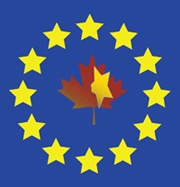The Rest of Canada wants consultations too.
from the Council of Canadians
 A final round of Canada-European Union free trade talks is just around the bend. From October 15 to 26, Canadian negotiators will be in Brussels to wrap up the Comprehensive Economic and Trade Agreement (CETA), or so they hope. That means a deal could be signed before the end of the year without any of us having a chance to see what’s in it!
A final round of Canada-European Union free trade talks is just around the bend. From October 15 to 26, Canadian negotiators will be in Brussels to wrap up the Comprehensive Economic and Trade Agreement (CETA), or so they hope. That means a deal could be signed before the end of the year without any of us having a chance to see what’s in it!
On October 5, the newly elected Parti Québécois government in Québec, under pressure from students, labour unions, trade justice activists and others, held a consultation on the CETA negotiations with over 50 civil society organizations, journalists, researchers and opposition members of the provincial legislature.
Jean-François Lisée, the PQ trade minister, wrote in his blog that the input from this meeting will “allow us to make clear recommendations to caucus, the Council of Ministers and the Premier regarding the mandate to give our negotiating team.” Even this late in the day, the Quebec government is apparently opening a small crack in the CETA negotiations for public input.
Take action
We should demand full transparency in every province and territory, and an opportunity to change the deal before it is signed! Use the form below to send a letter to your provincial government and opposition trade critics today! Make sure to send a copy of your letter to your local provincial representative, as well as municipal councillors, many of whom are also speaking up against CETA rules that affect local governments.
And while you’re at it, why not send a letter-to-the-editor in your local newspaper ?
Why write to the provinces?
We need to make this demand to our provincial and territorial leaders since they have been at the CETA bargaining table from the beginning. Secret documents made public over the past three years of EU trade talks show that the provincial-territorial governments have done a bad job protecting public services and important public policy from CETA rules designed to commercialize more and more aspects of our lives.
Drug policy changes the EU wants would increase already high drug costs in Canada by making it harder to introduce cheaper generic versions. How much would drug costs increase? The most credible study says almost $3 billion would be added annually to the cost of public and private drug plans. Already too many Canadians can’t afford to fill their prescriptions, and the provinces are looking for ways to contain health costs through bulk purchasing of generics. CETA would get directly in the way of that goal.
Drinking water and sanitation services, transit, energy, education, health care — all are to be treated as commodities under the CETA, and not as essential social services. Procurement rules will hamper economic development and job-creation options for municipal governments. These are some of the last equalizers local governments have in our increasingly unequal society. The goal of CETA is to push them out of public control in order to “liberate” them for profiteers.
It’s hard to argue with transparency
Whatever your position on these issues or the Canada-EU trade deal generally, it's hard to argue that provincial or territorial trade negotiators and a tiny group of ministers should have the exclusive authority to make a final decision in these and other areas. The Quebec government has opened the door a crack to the public. It’s time all provinces and territories followed this good example before it’s too late.
More information on CETA, the provinces and municipalities: www.canadians.org/CETA
Send your Premier an email from the Council fo Canadians website
 A final round of Canada-European Union free trade talks is just around the bend. From October 15 to 26, Canadian negotiators will be in Brussels to wrap up the Comprehensive Economic and Trade Agreement (CETA), or so they hope. That means a deal could be signed before the end of the year without any of us having a chance to see what’s in it!
A final round of Canada-European Union free trade talks is just around the bend. From October 15 to 26, Canadian negotiators will be in Brussels to wrap up the Comprehensive Economic and Trade Agreement (CETA), or so they hope. That means a deal could be signed before the end of the year without any of us having a chance to see what’s in it!
